#I hate marvel for the mistreatment of my most beloved boy
Text
Okay rant time, I'm so sorry for the people who don't follow me for stucky content, but I just have to let it out somewhere I'm so fucking sick and tired of Marvel and Disney playing Bucky's disability for laughs. He's a disabled person, he doesn't have an arm, he is an amputee, and yet they make him lose his arm again and again at every opportunity they can, just for laughs. What the fuck. It is so fucking insulting and hurtful to everyone, to everybody who is a fan of him, who identifies with him, and they just keep doing it . It is so fucking insulting I can't even put it into words, what the fuck like, please just let him be forgotten about for christ's sake.
#i need to gatekeep bucky from marvel itself#I have been in this fandom for almost a decade I don't give a fuck if new people agree or not with my point of view but please just forget>#he exists#let him and steve go#don't just keep ruining them#i hate it here#fuck#yk what I'm making this reblogable bc I no longer give a fuck about anything like go on#spread this#I hate marvel for the mistreatment of my most beloved boy#they donot deserve him
84 notes
·
View notes
Text
The Pulp Scifi That Inspired the X-Men
I wrote before about the sources of inspiration behind King Kong and Conan the Barbarian, as both of these were so far back in time the things that inspired them are not really read much.
With the X-Men, it’s important to remember that a subgenre of science fiction once existed about mutants who we identified with because they were persecuted and feared by normal humans, which allowed authors to use science fiction to explore the idea of alienation. X-Men is a part of this trend, and seems unique because it’s the only one from this long-standing trend that is actively discussed today. Really, this is a kind of story all people who feel gifted or alienated are compelled to create.
Slan by A.E. van Vogt
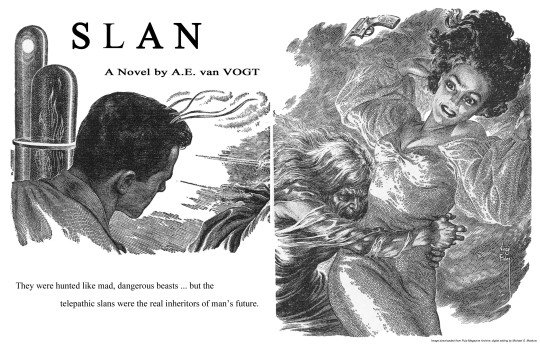
Slan is a story about Jommy Cross, a young boy who watches his parents die in front of him in the first chapter, hunted by the government because they are a telepathic, superintelligent and superstrong subrace of humans with antenna on their heads known as Slans. Slans are hunted to extinction by the corrupt government ruled by the world dictator, Kier Gray. Jommy has to go into hiding, wearing a hat to hide his tendrils.
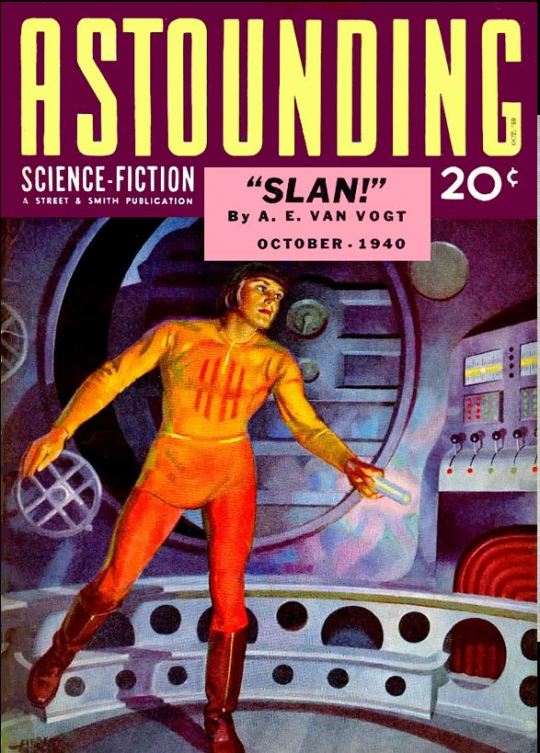
It’s a good bet that if you think about other planets a lot, it’s because you think this one is somehow a painful and unsuitable place to be for you. Slan is an extraordinarily well written novel that is still intriguing and mysterious even today, it always tops my list of recommendations when people ask me about pulp scifi because it absolutely holds up. What makes it so important is that scifi fandom responded with an unusually strong sense of identification. The circumstances and history of the Slan are not exactly like that of outsiders who are ostracized and “different,” but we relate to emotions, not specific life details. A lot of people who were homosexual, who’s parents are drunks and like to beat them, who were sexually abused, or extremely poor and alienated from richer peers, or just “on the outside looking in” can relate to the Slans. Scifi fans, who’s culture was incredibly fringe, called themselves “Slans” for years in fanzines an fan communications.
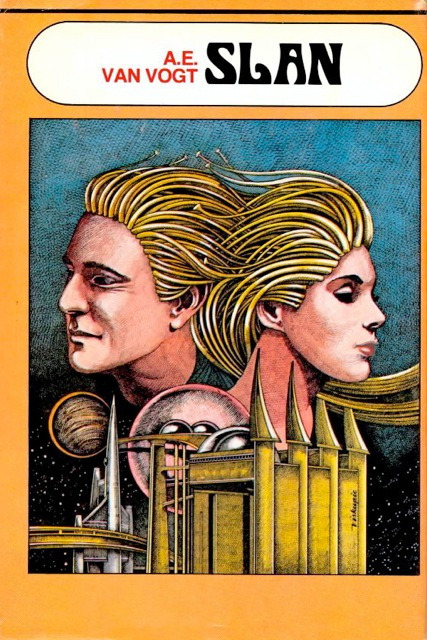
It’s no exaggeration to say that for the 1940s to the 1950s, Slan was the most beloved and widely read and influential science fiction novel, and maybe one of the best, too.
Mutant (aka the “Baldies” stories) by Henry Kuttner
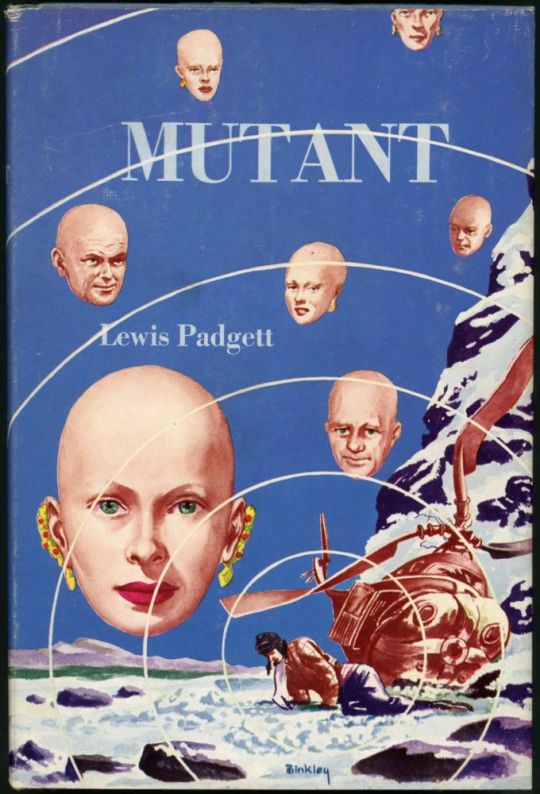
Maybe one of the best of scifi’s forgotten geniuses of the 1940s, Henry Kuttner’s Baldies books are actually a post-atomic story, about a community of telepathic mutants known as “baldies” who hide away from a human race that fears and hates them. All Baldies were linked in a telepathic uni-mind, so none of them were ever alone. The narrator is the last surviving member of his species; the enemy is the prejudice and paranoia of the self-destructive human race.
Children of the Atom by Wilmar H. Shiras

The idea of a school as a setting where mutant children can get refuge and hide from a prejudiced world that doesn’t understand them comes from this book.
In this one, due to atomic radiation, a sub-race of superintelligent humans emerges. They don’t have any mental powers except their superintelligence. The Children of the Atom take refuge in a school who’s true purpose is unknown. In the finale of the book, a human preacher leads a mob to the door of their school, which makes the Children realize they can’t isolate themselves from the rest of mankind.
Odd John by Olaf Stapledon
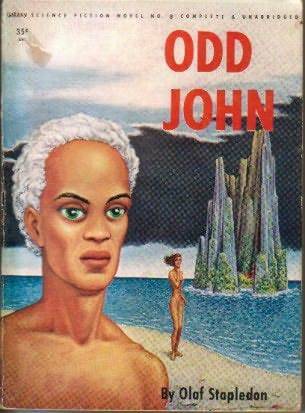
Olaf Stapledon used to be a big deal. He inspired Asimov, C.S. Lewis, and Heinlein with his extraordinary “Last and First Men,” a story set over a billion years about the entire sweep of human history. But one of his more interesting novels was “Odd John,” a novel about the first “evil mutant.” Odd John is a charismatic and sometimes truly creepy antihero, an unusual mutant born ahead of his time; he switches between sympathetic and monstrous. We see his brutal mistreatment at the hands of the human race, but then see him use his powers on women in eerie ways, and see the hardened person he became, who created an island kingdom and base separate from the rest of the human race, a move that the evil mutants in Marvel, in imitation of Odd John, often did several times.

A lot of people identify the evil mutants with militant black leftists, but in the actual comics themselves, their worldview had way less to do with Marx and Malcolm X (as with “Dune is about oil,” that a giveaway someone hasn’t read it and just knows about it), and way more to do with some combination of Nietzsche and Captain Nemo. Like Nietzsche, their worldview is that traditional human morality doesn’t apply to them as another species. Each evil mutant is Nietzsche’s conception of the superman, elevated beyond good and evil and a “sovereign citizen” laws can’t govern. Nietchean “will to power” thinking is found in every single speech by Magneto. Likewise, like Captain Nemo, they are often driven by an urge for solitude in places they can’t be commanded by the small mindedness and petty tyranny of humans. Odd John combined both of these together: he was a Nietzchean superman who had a cruel disdain for ordinary morality, who’s strongest desire was to be left alone.
He That Hath Wings by Edmond Hamilton

The Angel has a very specific point of origin: a wonderful and tragic story about a mutant born with wings by “Planet Smasher” Edmond Hamilton, who was always fascinated by notions of mutation and human evolution; he invented the story about the “guy who invents an evolution ray.”
The titular mutant is a man born with wings, who, when he falls in love, cuts them off to blend in with the normal human race. He loves his wife so much he gave up flight for her, but unexpectedly, his wings grow back at the end. He knows he has to get rid of them to blend into society, but he is allowed one last night of flight.
Gladiator by Philip Wylie

Fans of Superman probably know this novel as one of the major inspirations for the creation of Superman (possibly THE major inspiration), with Hugo Danner, an artificially created mutant who is superstrong, invulnerable, and able to “leap tall buildings in a single bound.”
I’d compare Philip Wylie to Michael Crichton: he was the one “bestseller” scifi novelist at a time when scifi was ghettoized. His work was regularly on the best seller list, including “When Worlds Collide,” a novel that created the “disaster” genre as we know it today, and is still influential through it’s film adaptation.
Philip Wylie’s Gladiator didn’t just create Superman. The angst and anger over being in a world you never made that later became a big part of the superhero story was all right there from the beginning. Hugo Danner was a misanthrope who’s attempts to help were stopped by a senseless and incomprehending mankind that feared and hated him. Like Slan, this is yet another novel from the past that is surprisingly readable and good today.
The Humanoids by Jack Williamson
This is where the Sentinels came from.

To be clear: Jack Williamson did not invent the idea of robots who turn on the human race. But the very specific kind of robot the Sentinels are comes from the Humanoids, a novel about robots that take the instruction to protect mankind incredibly literally to the point they become dictators and ruthlessly command us, and battles consist of them adapting instantly to whatever strategies the human race uses.
466 notes
·
View notes